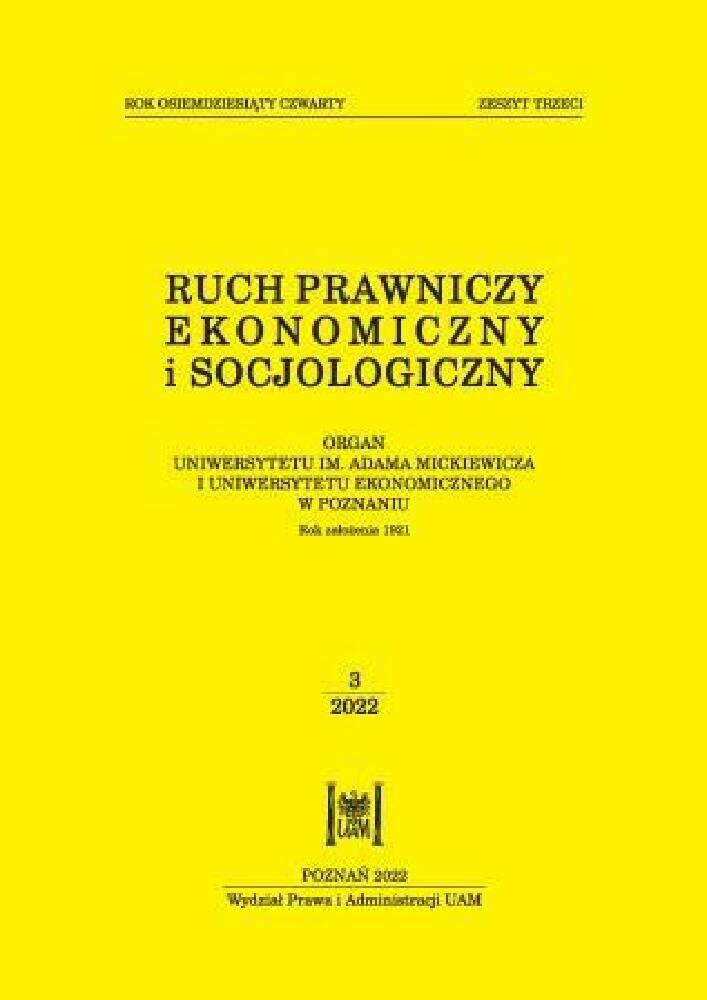Abstract
The article deals with the issue of the professional activity of social workers during the COVID-19 pandemic. The main research problems are assessing the degree of implementation of social work; changes perceived in the functions of social work, and observing changes in the functioning of the represented organization. My research goal was to determine the differences in professional activity and in the attitudes of social workers, taking into account the type of municipality represented by the respondent, the size of the designated institution, the experience of the social workers, and the type of professional position. The research was conducted using the computer-assisted web interviewing (CAWI) technique among social workers in the Greater Poland Province who engaged in work during the COVID-19 pandemic. The research results (N = 284) show that during the pandemic social workers focused particularly on administrative activities and providing assistance in the form of protective measures. This was especially visible in rural and urban-rural municipalities. In smaller centres, activities in the field of social integration and defence of the rights and interests of people in a difficult social situation were also undertaken less frequently. The analysis of empirical material leads to conclusions about social work during the COVID-19 pandemic being an activity aimed at satisfying basic care needs and ensuring the financial security of people at risk. Environmental and civic involvement are on the margins of professional activity.
References
Amadasun, S. (2021). COVID-19 pandemic in Africa: what lessons for social work education and practice? International Social Work 64(2): 246–250.
Bankoff, G. (2003). Cultures of Disaster: Society and Natural Hazard in the Philippines. London.
Berg-Weger M., Morley, J. (2020). Loneliness and social isolation in older adults during the COVID-19 pandemic: implications for gerontological social work. The Journal of Nutrition, Health and Aging 24: 456–458.
Bussolini, J. (2010). What is a dispositive? Foucault Studies 10: 85–107.
Boruszkowska, I. (2020). La mortelega grande, czyli „wielkie umieranie”. Zaraza jako katastrofa (w) wyobraźni. Konteksty Kultury 17(3): 312–327.
Brennan, J., Reilly, P., Cuskelly, K., Donnelly, S. (2020). Social work, mental health, older people and COVID-19. International Psychogeriatrics 32(10): 1205–1209.
Buttell, F., Ferreira, R.J. (2020). The hidden disaster of COVID-19: intimate partner violence. Psychological Trauma: Theory, Research, Practice, and Policy 12(1): 197–198.
Cullen, W., Gulati, G., Kelly, B.D. (2020). Mental health in the COVID-19 pandemic. QJM: An International Journal of Medicine 113(5): 311–312.
Czarnow, S. (2021). Między stanem epidemii a stanem klęski żywiołowej – COVID-19 a niektóre prawa człowieka. Radca Prawny. Zeszyty Naukowe 3(28): 11–42.
Drozdowski, R., Krajewski, M., Luczys, P., Kubacka, M. (2022). In between: on the defensive reactivity of public institutions in Poland to the COVID-19 pandemic. Ruch Prawniczy, Ekonomiczny i Socjologiczny 84(1): 229–246.
Farkas, K.J., Romaniuk, J.R. (2020). Social work, ethics and vulnerable groups in the time of coronavirus and COVID-19. Society Register 4(2): 67–82.
Frysztacki, K. (2009). Socjologia problemów społecznych. Warszawa.
Han, J., Meyer, B.D., Sullivan, J. (2020). Income and poverty in the COVID-19 pandemic. National Bureau of Economic Research. <http://www.nber.org/papers/w27729> [dostęp: 31.05.2022].
Krzyszkowski, J. (2005). Między państwem opiekuńczym a opiekuńczym społeczeństwem. Determinanty funkcjonowania środowiskowej pomocy społecznej na poziomie lokalnym. Łódź.
Necel, R. (2019). Advocacy in action: theory and practice of social work. Polish Sociological Review 4(208): 511–525.
Necel, R. (2021). Rzecznictwo wybranych problemów społecznych z perspektywy socjologicznej. Poznań.
Nunnally, J.C. (1978). Psychometric Theory. 2nd edn. New York.
Patel, J.A., Nielsen, F.B.H., Badiani, A.A., Assi, S., Unadkat, V.A., Patel, B., ... & Wardle, H. (2020). Poverty, inequality and COVID-19: the forgotten vulnerable. Public Health 183: 110–111.
Pentini, A.A., Lorenz, W. (2020). The Corona crisis and the erosion of ‘the social’ – giving a decisive voice to the social professions. European Journal of Social Work 23(4): 543–553.
Potutan, G., Arakida, M. (2021). Evolving disaster response practices during COVID-19 pandemic. International Journal of Environmental Research and Public Health 18(6): 31–37.
Powell, K.G., Peterson, N.A. (2014). Pathways to effectiveness in substance abuse prevention: empowering organizational characteristics of community-based coalitions. Human Service Organizations: Management, Leadership & Governance 38(5): 471–486.
Puig, M.E., Glynn, J.B. (2004). Disaster responders. Journal of Social Service Research 30(2): 55–66.
Revet, S., Langumier, J. (2015). Governing Disasters: Beyond Risk Culture. London.
Revet, S. (2020). Disasterland: An Ethnography of the International Disaster Community. London.
Rothman, J. (1983). Three Models of Community Organization Practice, [w:] R. Kramer, H. Specht (eds.), Readings in Community Organization Practice. New York.
Rothman, J. (2007). Multi modes of intervention at the macro level. Journal of Community Practice 15(4): 11–40.
Rymsza, M. (2012). W stronę pracy środowiskowej i nowych ról zawodowych pracowników socjalnych, [w:] M. Rymsza (red.), Pracownicy socjalni i praca socjalna w Polsce. Między służbą społeczną a urzędem. Warszawa: 203–226.
Sánchez, O.R., Vale, D.B., Rodrigues, L., Surita, F.G. (2020). Violence against women during the COVID-19 pandemic: an integrative review. International Journal of Gynecology & Obstetrics 151(2): 180–187.
Szmagalski, J. (2021). Pandemia COVID-19 a praca socjalna – z pierwszych relacji w periodykach o zasięgu międzynarodowym. Praca Socjalna 36(1): 5–30.
Trochymiak, M. (2018). Uznaniowość w pomocy społecznej: działania pracowników socjalnych w świetle koncepcji street-level bureaucracy. Polityka Społeczna 9(534): 12–19.
Twelvetrees, A. (2017). Community Development, Social Action and Social Planning. London.
Wu, H., Karabanow, J. (2020). COVID-19 and beyond: social work interventions for supporting homeless populations. International Social Work 63(6): 790–794.
License
Copyright (c) 2022 WPiA UAM

This work is licensed under a Creative Commons Attribution-NonCommercial-NoDerivatives 4.0 International License.





